Reichardt’s friends get the last word

It took death to deprive William J. “Bill” Reichardt of the last word.
W.A. Krause, who knew the affable Des Moines clothier as well as anyone, says the last thing Reichardt would have wanted was a big funeral, but the memorial tribute Thursday and funeral Mass Friday were expected to be among the largest ever in Iowa. Reichardt died on June 1 at Iowa Methodist Medical Center, nine months after doctors diagnosed him with cancer. He was 73.
“He would have wanted a big party, but not a big funeral,” said Krause, president and chief executive of Krause Gentle Corp. and founder of the Kum & Go convenience store chain. “It’s the only time in his life he didn’t have the last word.”
But, Reichardt’s friend conceded, even the silence of death might not accomplish that in the end. “I feel we haven’t heard the last of Bill Reichardt,” Krause said. “Certain people, when they die, start the clock over. I’m not the only one who knows a million stories about Bill, and as they become embellished, enlarged and enhanced, no one is going to be around to challenge and deny them. They’re just going to get better.”
A University of Iowa football star in the 1950s, his became a household name with “I’m Bill Reichardt, and I own the store,” the slogan he used in television commercials advertising Reichardt’s Clothing. He was a successful businessman, but cut from a different bolt of cloth than most of his friends, Krause said.
“When Jim Cownie, Randy Duncan and other businessmen get together, they talk about financial outcome,” Krause said. “Reichardt would be bored. He had a passion for life instead of a love for money, and that made him unique and different, particularly from the crowd he hung around with.”
“He would rather give you advice than sell you a suit,” said another close friend, William C. Knapp, founder of Iowa Realty.
Among Reichardt’s legacies, Knapp said, was his capacity to care about others, particularly young people. He championed small businesses during a six-year stint in the Iowa Legislature in the late 1960s, first as a state representative and then as a senator. His unsuccessful bid for the Democratic nomination for governor in 1994 in large part stemmed from his passion to get juveniles off the street and back into school.
“We should learn from him that there are other things besides making money or running a business. Caring about people, caring about kids, caring about the well-being of others was his trademark,” Knapp said. “We should take that and use it in our lives and make things better for everyone.”
“If he made an enemy,” Krause said, “it was for a very short time.”
When Reichardt died Tuesday night surrounded by friends and family, his thoughts were of others. His pal Barbara Henry, publisher of The Des Moines Register from 1996 to 2000 and now the publisher of the Indianapolis Star, called to speak with him one last time. Krause, among those keeping vigil at Reichardt’s bedside, says he had been unable to speak for days, but summoned the strength to reply, “Barb, I love you, too.”
“She was supposed to be heard,” Krause said. “Bill recognized that.”
Henry hadn’t been on the job at the Register long when Reichardt called and invited her to lunch. They became friends quickly, playing racquetball together regularly at the downtown YMCA and meeting for lunch or drinks. When Reichardt and his wife, Sue, visited Henry in Indianapolis a couple of years ago, she found his personality effervescent as always.
“It made me feel good when I was with him,” Henry said. “Des Moines is not going to be the same place. He knew everybody.
“Bill lived. He lived every day. He loved life. He had a fabulous sense of humor and loved people.”
His friends recalled him as being generous, both with his money and with less tangible assets.
“Bill gave the most valuable asset there is, and that was his time,” Krause said. “Bill had time for everyone, and I don’t think anybody ever compete with that. If you’re in social work, that’s expected, but not when you’re a busy businessman.
“People would call him and ask, ‘Will you meet me at Mondos?’ and he’d go listen. I’d ask who that was and he’d reply, ‘I don’t know, a friend of another friend. They just wanted me to listen.’”
Krause considered his friend indestructible, even as cancer was wracking his body. “I didn’t think anything could get him,” he said. “He was a symbol for everyone, not for the haves or have-nots, but for everyone. Bill represented life.”
“Des Moines lost something when we lost him,” Knapp said. “He was kind of like a part of Des Moines, and it doesn’t quite seem right for him to be gone.”






